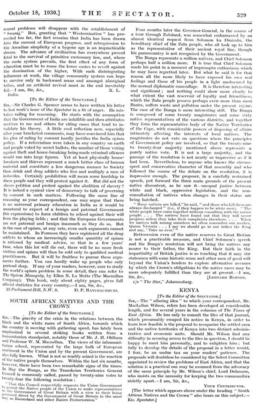SOUTH AFRICAN NATIVES AND THE CROWN
[To the Editor of the SPECTATOR.] S1R,—The gravity of the crisis in the relations between the black and the white races of South Africa, towards which the country is moving with gathering speed, has lately been emphasized in several striking books written from a humanitarian standpoint, notably those of Mr. J. H. Oldham and Professor W. M. Macmillan. The views of the inhumani- tarian school, represented by the large bulk of European sentiment in the Union and by the present Government, are also fully known. What is not so readily seized is the reaction of the native people themselves. Within the last six months, however, there have been two remarkable signs of the times. In May the Bunga, as the Transkeian Territories General Council is commonly called, passed by twenty-nine votes to twenty-four the following resolution : " That this Council respectfully requests the Union Government to permit the Native people of the Union to make representations to the Government of Groat Britain with a view to their being governed direct by the Government of Great Britain in the same Way as Basutoland and other Native Protectorates."
Four months later the Governor-General, in the course of a tour through Zululand, was somewhat embarrassed by an almost identical request from Solomon ka Dinizulu, the hereditary chief of the Zulu people, who all look up to him as the representative of their ancient royal line, though his paramountcy is not recognized by the Government.
The Bunga represents a million natives, and Chief Solomon perhaps half a million more. It is true that Chief Solomon made his point in a moment of impromptu enthusiasm which he may have regretted later. But what he said is for that reason all the more likely to have exposed his own real feelings and those of his people in a light unobscured by the normal diplomatic camouflage. It is therefore interesting and significant ; and nothing could show more clearly to what extent the vast reservoir of loyalty and friendliness, which the Zulu people possess perhaps even more than most Bantu, suffers waste and pollution under the present ricgiine. The ease of the Bunga is more interesting still. The Bunga is composed of some twenty magistrates and sonic sixty native representatives of the various districts, and together they form the representative body of the Native Territories of the Cape, with considerable powers of disposing of affairs intimately affecting the interests of local natives. The magistrates do not vote on questions where the principles of Government policy arc involved, so that the twenty-nine to twenty-four majority mentioned above represents a purely native vote. It is not a large majority, and the passage of the resolution is not nearly so impressive as if it had been. Nevertheless, to anyone who knows the circum- spect and conservative character of that assembly and who followed the course of the debate on the resolution, it is impressive enough. The proposer, in a carefully restrained speech, put forward the three main grounds of the present native discontent, as he saw it—unequal justice between white and black, oppressive legislation, and the non- consultation of natives when changes in their status are being hatched.
" Many natives are killed," ho said, " and those who kill them are always discharged " (i.e., if they happen to be white men). " Tho white people have come together without consulting with the native people.. . . The natives have found out that they will never progress unless they take their complaints elsewhere. . . . When we natives talk among ourselves we often remember our mother, Queen Victoria . . . I say we should go to our father the King and say, Take us over.' "
Retrocession even of the native reserves to Great Britian is not a practicable measure, and Chief Solomon's speech and the Bunga's resolution will not bring the natives any nearer to their father, the King. But their faith in the impartiality of British justice is so touching that it may stir statesmen with some historic sense and other men of good will beyond the Union's borders to explore alternative avenues by which the Crown's obligations to the native races may be more adequately fulfilled than they are at present.—I am,
























































 Previous page
Previous page